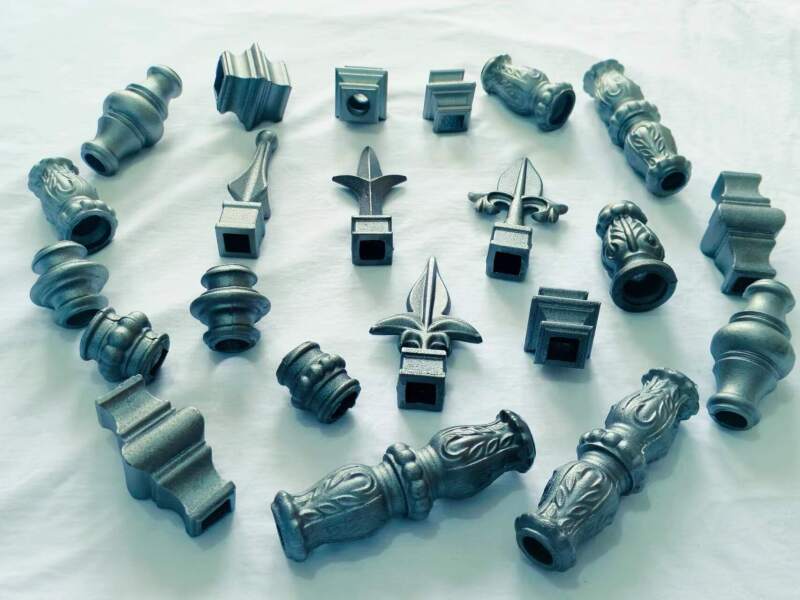
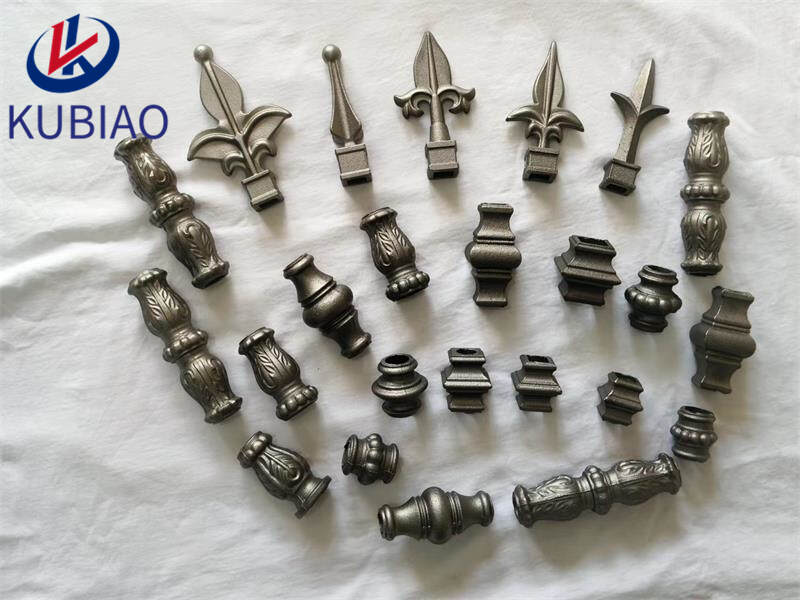
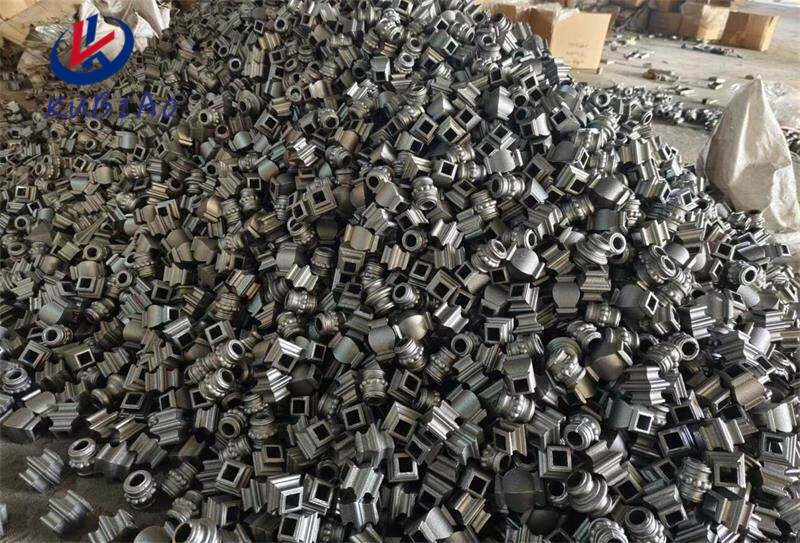
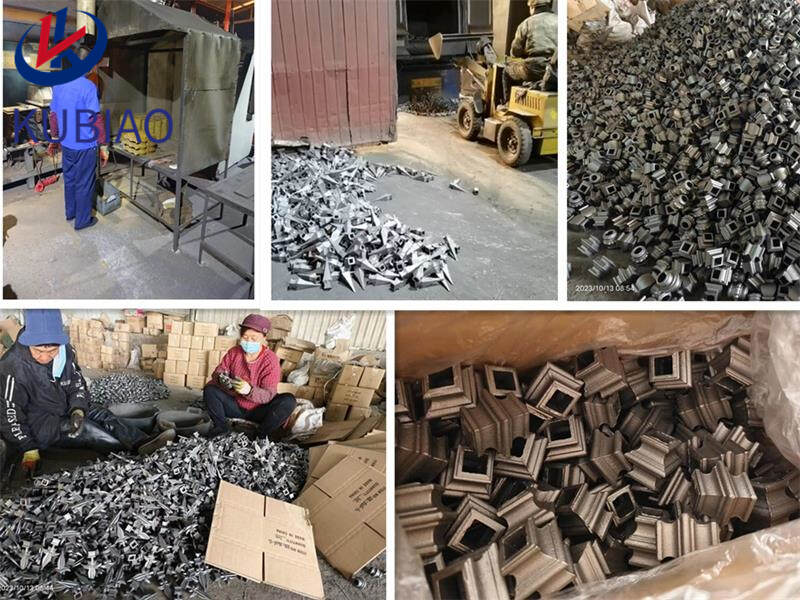
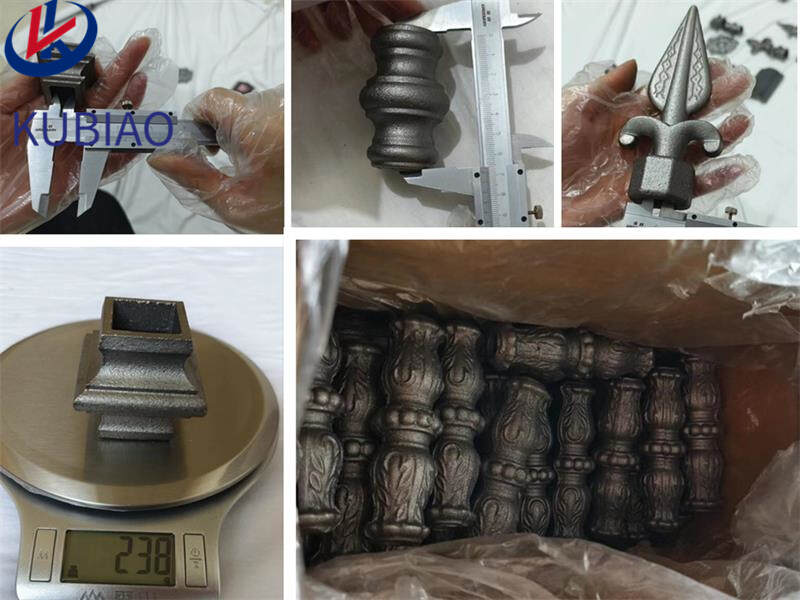
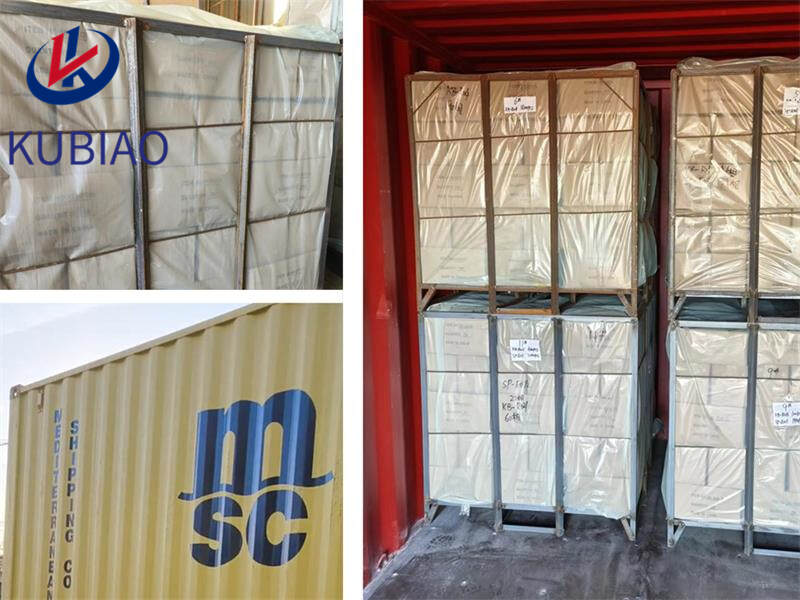
| Product name | cast iron fence ornamental |
| Keyword | cast iron end cap,fencing metal spears,cast iron ,cast iron leaf,ornamental spearheads ,cast iron bushing,4x4 cast iron post caps,flower panel |
| Place of Origin | China |
| Quality standard | We have our own professional QC team to insure the quality. |
| Feature | Cast iron is a strong metal material that can withstand large amounts of pressure and weight. It is also durable and resistant to corrosion, making it ideal as a decorative item |
| Application scope | wedding, etc. |
| surface treatment | sand blasting antirust antirust oil/water painting hot dip galvanizing |
| Unit Weight(g) | 512(Contact us for specific information to confirm) |
| terms of payment | 50% T/T in advance, balance before shipment. |
| Life span | 28 years (Contact us for specific information to confirm) |
| delivery time | It usually takes 40 days. |
| Advantage | We keep good quality and competitive price to ensure our customers benefit |
| Packing | 15x15.49x12.8cm(Contact us for specific information to confirm) |
| OEM/ODM | Customization Service Provided |
| design | beautiful elegance sleek pretty |
| Sales country | All over the world for example:Navassa Island,Japan,Suriname,Canada,Saudi Arabia |
| MOQ | 200pcs(Contact us for specific information to confirm) |
1.Can I use cast iron fence ornamental in a minimalist or modern decor style?
We pay attention to the transformation of intellectual property protection and innovation achievements. Your OEM or ODM order design we have a complete confidentiality system.
Yes, cast iron ornaments can be used in a minimalist or modern decor style. They can add a touch of texture and contrast to a clean and simple space. The key is to choose pieces that have a sleek and simple design, rather than ornate or intricate details. You can also incorporate them in a monochromatic color scheme to create a cohesive and modern look.
2.Are there any common design elements found in cast iron fence ornamental ?
1. Intricate Details: Cast iron ornaments often feature intricate and detailed designs, such as floral patterns, scrollwork, and geometric shapes.
2. Curved and Organic Shapes: Many cast iron ornaments have curved and organic shapes, which are achieved through the casting process.
3. Symmetry: Symmetry is a common design element in cast iron ornaments, with designs often being mirrored on both sides.
4. Repetition: Many cast iron ornaments feature repeated patterns or motifs, creating a sense of unity and cohesion in the design.
5. Textures: Cast iron ornaments can have a variety of textures, including smooth, rough, and hammered surfaces, adding visual interest and depth to the design.
6. Finials and Fleur-de-lis: Finials, which are decorative end pieces, and fleur-de-lis, a stylized lily flower, are commonly found in cast iron ornaments, adding a touch of elegance and sophistication.
7. Gothic and Victorian Influences: Cast iron ornaments often draw inspiration from Gothic and Victorian architecture, featuring pointed arches, spires, and intricate details.
8. Natural Elements: Many cast iron ornaments incorporate natural elements, such as leaves, flowers, and animals, into their designs.
9. Rustic and Industrial Aesthetics: Cast iron ornaments can also have a rustic or industrial aesthetic, with rough textures and simple, geometric designs.
10. Black or Dark Colors: Due to the nature of cast iron, most ornaments are black or dark in color, adding a sense of drama and contrast to the design.
3.What are some popular uses for cast iron fence ornamental ?
We should perform well in market competition, and the prices of cast iron fence ornamental products have a great competitive advantage.
1. Garden Decorations: Cast iron ornaments are commonly used as garden decorations, such as planters, statues, and bird baths.
2. Home Decor: Cast iron ornaments can add a touch of elegance and charm to any room in the house. They can be used as wall hangings, bookends, or as decorative accents on shelves and tables.
3. Architectural Details: Cast iron ornaments are often used as architectural details on buildings, such as door knockers, window grills, and balcony railings.
4. Fireplace Accessories: Cast iron ornaments can be used as fireplace accessories, such as firebacks, grates, and tool sets.
5. Furniture Accents: Cast iron ornaments can be incorporated into furniture design, such as table legs, chair backs, and drawer pulls.
6. Signage: Cast iron ornaments can be used as decorative elements on signs, both indoors and outdoors.
7. Holiday Decorations: Cast iron ornaments are popular for holiday decorations, such as Christmas tree ornaments and Halloween decorations.
8. Souvenirs and Gifts: Cast iron ornaments make unique and memorable souvenirs and gifts, as they can be personalized and have a timeless appeal.
9. Collectibles: Cast iron ornaments are often collected by enthusiasts for their historical and artistic value.
10. DIY Projects: Cast iron ornaments can be used in various DIY projects, such as creating custom wall art, jewelry, and home accents.
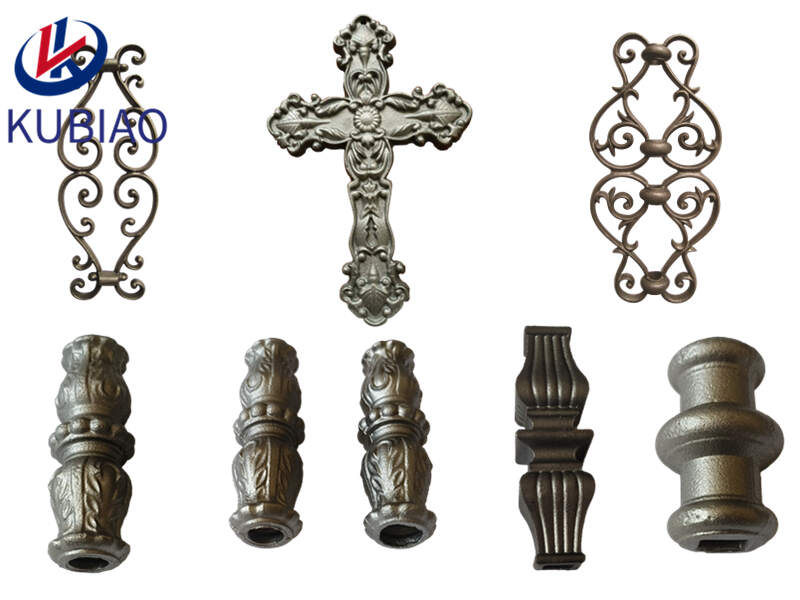
4.Are there any cultural or symbolic meanings behind certain cast iron ornament designs?
We actively participate in the cast iron fence ornamental industry associations and organization activities. The corporate social responsibility performed well, and the focus of brand building and promotion
Yes, there are several cultural and symbolic meanings associated with certain cast iron ornament designs. Some common examples include:
1. Fleur-de-lis: This symbol, which resembles a stylized lily or iris, is often associated with French culture and royalty. It is also used as a symbol of purity, light, and life.
2. Celtic Knots: These intricate designs, often seen in Celtic and Irish cultures, symbolize eternity, continuity, and interconnectedness.
3. Dragon: In many Asian cultures, dragons are seen as powerful and auspicious creatures, representing strength, wisdom, and good luck.
4. Sunburst: This design, featuring rays of light emanating from a central point, is often associated with the sun and its life-giving properties. It can also symbolize enlightenment and spiritual growth.
5. Pineapple: In Western cultures, the pineapple is often seen as a symbol of hospitality, warmth, and welcome.
6. Tree of Life: This design, featuring a tree with spreading branches and deep roots, is a common symbol in many cultures, representing the interconnectedness of all living things and the cycle of life.
7. Anchor: In maritime cultures, the anchor is a symbol of stability, strength, and hope.
8. Cross: The cross, a symbol of Christianity, is often seen in cast iron designs and can represent faith, sacrifice, and redemption.
9. Horseshoe: In many cultures, the horseshoe is seen as a symbol of good luck and protection.
10. Star of David: This six-pointed star is a symbol of Judaism and can represent unity, balance, and divine protection.
5.How can I incorporate cast iron fence ornamental into my holiday decor?
We are a new cast iron fence ornamental manufacturer.
1. Hang them on the Christmas tree: Use small cast iron ornaments as unique and rustic additions to your Christmas tree. They can add a touch of vintage charm and contrast well with traditional glass or plastic ornaments.
2. Create a centerpiece: Arrange a few cast iron ornaments in a bowl or on a tray with some greenery and candles to create a festive centerpiece for your dining table or mantel.
3. Use as stocking holders: Instead of traditional stocking holders, use heavy cast iron ornaments to hold up your stockings. They will add a unique and unexpected touch to your holiday mantel.
4. Decorate your wreath: Add some interest to your holiday wreath by incorporating a few cast iron ornaments into the design. They can be hung from the wreath or nestled among the greenery.
5. Place on a garland: String a garland along your staircase or mantel and use cast iron ornaments as accents throughout. This will add a rustic and charming touch to your holiday decor.
6. Use as napkin rings: Wrap a small cast iron ornament around a cloth napkin to create a unique and festive napkin ring for your holiday table setting.
7. Hang on doorknobs: Add a touch of holiday cheer to your doors by hanging cast iron ornaments on the doorknobs. This is a simple and easy way to incorporate them into your decor.
8. Create a vignette: Arrange a few cast iron ornaments on a tray or in a bowl with other holiday decorations, such as pinecones, candles, or greenery, to create a festive vignette for your coffee table or sideboard.
9. Personalize with paint: If you have plain cast iron ornaments, you can personalize them by painting them with holiday designs or messages. This is a fun and creative way to make them stand out in your decor.
10. Use as gift toppers: Instead of traditional bows or ribbons, use small cast iron ornaments as gift toppers. This will add a unique and rustic touch to your gift wrapping.
6.What are some creative ways to display cast iron fence ornamental ?
We enjoy high authority and influence in the industry and continue to innovate products and service models.
1. Hang them on a rustic wooden ladder: Lean a wooden ladder against a wall and hang the cast iron ornaments from the rungs. This creates a unique and eye-catching display.
2. Create a wall collage: Arrange a variety of cast iron ornaments on a wall in a collage-style display. Mix and match different sizes and shapes for an eclectic look.
3. Use them as bookends: Place a pair of matching cast iron ornaments on either side of a row of books to create a functional and decorative display.
4. Display them in a terrarium: Place a few cast iron ornaments inside a glass terrarium for a whimsical and unexpected display.
5. Hang them from a chandelier: If you have a chandelier or light fixture with multiple arms, hang a few cast iron ornaments from the arms for a unique and elegant display.
6. Create a centerpiece: Arrange a few cast iron ornaments on a tray or platter and use them as a centerpiece on a dining table or coffee table.
7. Hang them from a branch: Find a sturdy branch and hang the cast iron ornaments from it using twine or ribbon. This creates a natural and rustic display.
8. Use them as garden stakes: Stick the cast iron ornaments into the ground in your garden or flower bed to add a touch of whimsy and charm.
9. Display them on a mantel: Arrange a few cast iron ornaments on a mantel along with other decorative items for a charming and festive display.
10. Hang them from a curtain rod: Use curtain clips to hang cast iron ornaments from a curtain rod for a unique and unexpected display.
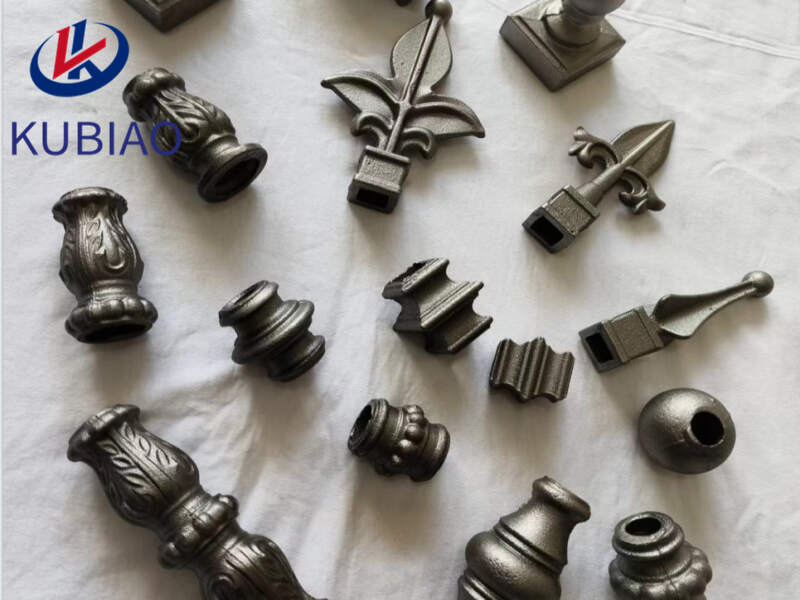
7.What are some common misconceptions about cast iron fence ornamental ?
Being one of the top cast iron fence ornamental manufacturers in China, We attach great importance to this detail.
1. They are fragile: Many people assume that cast iron ornaments are delicate and can easily break. However, cast iron is a strong and durable material that can withstand harsh weather conditions and heavy use.
2. They are expensive: While some cast iron ornaments may be pricey, there are also many affordable options available. Additionally, their durability and longevity make them a cost-effective choice in the long run.
3. They are only suitable for traditional or rustic styles: Cast iron ornaments are often associated with traditional or rustic decor, but they can also add a touch of elegance and sophistication to modern or contemporary spaces.
4. They are difficult to maintain: Some people believe that cast iron ornaments require a lot of maintenance and upkeep. However, with proper care and occasional cleaning, they can last for many years without any issues.
5. They are all the same: Cast iron ornaments come in a variety of designs, sizes, and finishes. They can be intricately detailed or simple and sleek, making them suitable for different styles and preferences.
6. They are only for outdoor use: While cast iron ornaments are commonly used in outdoor spaces, they can also be used indoors to add a unique and decorative touch to any room.
7. They are heavy and difficult to install: While cast iron ornaments can be heavy, they are not necessarily difficult to install. Many come with mounting hardware or can be easily hung with screws or nails.
8. They are only for decorative purposes: While cast iron ornaments are often used for decorative purposes, they can also serve functional purposes such as supporting plants or serving as bookends.
9. They are prone to rust: While cast iron can rust if not properly cared for, many modern cast iron ornaments are coated with a protective finish to prevent rusting.
10. They are outdated: Cast iron ornaments have been used for centuries and have stood the test of time. They continue to be a popular choice for home decor, making them far from outdated.
8.How long do cast iron fence ornamental typically last?
We attach importance to the innovation ability and team spirit of employees, have advanced R & D facilities and laboratories, and have a good quality management system.
Cast iron ornaments can last for decades or even centuries if they are properly cared for and maintained. However, their lifespan can vary depending on factors such as exposure to harsh weather conditions, regular cleaning and maintenance, and the quality of the cast iron itself. With proper care, cast iron ornaments can last for generations.
9.How have cast iron fence ornamental evolved over time?
We focus on innovation and continuous improvement to maintain a competitive advantage.
Cast iron ornaments have evolved significantly over time, both in terms of their design and production methods. Here are some key changes that have occurred:
1. Early designs: The earliest cast iron ornaments were simple and functional, such as door knockers, hinges, and fireplace tools. These were often made using sand casting techniques and had a utilitarian look.
2. Victorian era: In the mid-19th century, cast iron ornaments became more decorative and ornate, reflecting the Victorian love for intricate designs and embellishments. This era saw the rise of cast iron garden furniture, fountains, and statues, often featuring elaborate floral and animal motifs.
3. Industrial revolution: With the advent of the industrial revolution, cast iron ornaments became more affordable and accessible to the middle class. This led to a proliferation of cast iron products, including street lamps, railings, and building facades.
4. Art Nouveau and Art Deco: In the late 19th and early 20th centuries, cast iron ornaments were influenced by the Art Nouveau and Art Deco movements, which favored more fluid and geometric designs respectively. This led to the creation of cast iron gates, grilles, and other architectural elements with intricate patterns and motifs.
5. Modern era: In the 20th century, cast iron ornaments continued to evolve, with a focus on functionality and minimalism. Modern designs often feature clean lines and geometric shapes, and are used in a variety of applications, from furniture to home decor.
6. Production methods: While sand casting was the primary method of producing cast iron ornaments in the past, modern techniques such as die casting and investment casting have made the process more efficient and precise. This has allowed for the creation of more intricate and detailed designs.
7. Materials: While cast iron was the preferred material for ornaments in the past, modern advancements have led to the use of other materials such as aluminum and bronze. These materials offer greater strength and durability, while still retaining the look and feel of cast iron.
Overall, cast iron ornaments have evolved from simple and functional objects to highly decorative and versatile pieces, reflecting the changing tastes and advancements in technology over time.
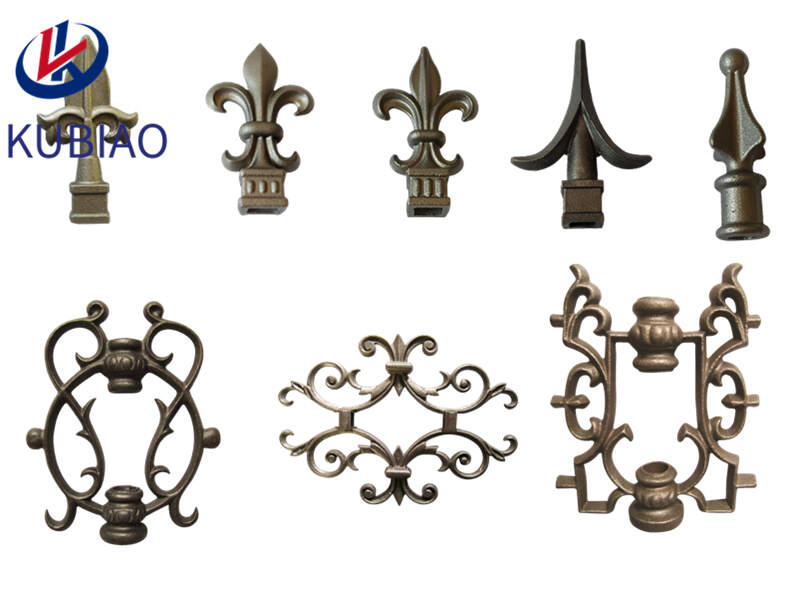
10.How are cast iron fence ornamental made?
We continue to improve cast iron fence ornamental products and processes to improve efficiency.
1. Creating a Design: The first step in making cast iron ornaments is to create a design. This can be done by hand-drawing or using computer-aided design (CAD) software.
2. Making a Mold: Once the design is finalized, a mold is created. This can be made from wood, metal, or other materials. The mold is usually made in two halves, with the design carved or etched into it.
3. Preparing the Iron: Cast iron is made by melting iron and adding other elements such as carbon, silicon, and manganese to create a strong and durable material. The iron is heated in a furnace until it reaches a molten state.
4. Pouring the Iron: Once the iron is molten, it is poured into the mold. The mold is usually preheated to prevent the iron from cooling too quickly and to ensure a smooth finish.
5. Cooling and Removal: The iron is left to cool and solidify in the mold. Once it has cooled, the mold is opened and the cast iron ornament is removed.
6. Finishing: The cast iron ornament may have rough edges or imperfections from the casting process. These are removed by grinding, sanding, or filing. The ornament may also be polished or painted to achieve the desired finish.
7. Inspection: The finished ornament is inspected for any defects or imperfections. Any necessary touch-ups or repairs are made at this stage.
8. Packaging and Shipping: The final step is to package the cast iron ornament for shipping or display. This may involve adding protective packaging or attaching hanging hardware if necessary.
11.What are the differences between cast iron fence ornamental and other metal decorations?
We have advantages in marketing and channel expansion. Suppliers have established good cooperative relations, continuously improved workflows, improved efficiency and productivity, and provided customers with high -quality products and services.
1. Material: The main difference between cast iron ornaments and other metal decorations is the material used. Cast iron ornaments are made from iron that has been melted and poured into a mold, while other metal decorations can be made from a variety of metals such as aluminum, brass, copper, or steel.
2. Weight: Cast iron ornaments are typically heavier than other metal decorations due to the density of iron. This can make them more durable and less likely to be blown over by strong winds.
3. Strength: Cast iron is known for its strength and durability, making cast iron ornaments more resistant to damage and wear compared to other metal decorations.
4. Rust resistance: Cast iron is prone to rusting, so cast iron ornaments may require regular maintenance to prevent rust. Other metal decorations, such as aluminum or stainless steel, are more resistant to rust and may require less maintenance.
5. Design options: Cast iron ornaments are limited in terms of design options due to the casting process. Other metal decorations can be formed into more intricate and detailed designs using techniques such as welding, bending, and cutting.
6. Cost: Cast iron ornaments tend to be more expensive than other metal decorations due to the cost of the materials and the labor-intensive casting process.
7. Versatility: Other metal decorations can be used both indoors and outdoors, while cast iron ornaments are primarily used for outdoor decor due to their weight and rust-prone nature.
8. Historical significance: Cast iron has been used for centuries in architectural and decorative elements, giving cast iron ornaments a sense of history and tradition that other metal decorations may not have.
12.Can I paint or modify cast iron fence ornamental ?
Our mission is to provide customers with the best solutions for cast iron fence ornamental .
Yes, you can paint or modify cast iron ornaments. However, it is important to properly prepare the surface before painting to ensure the paint adheres well. This may include sanding, priming, and using a rust-inhibiting paint. Additionally, if you plan to modify the ornament, make sure to use appropriate tools and techniques to avoid damaging the cast iron.
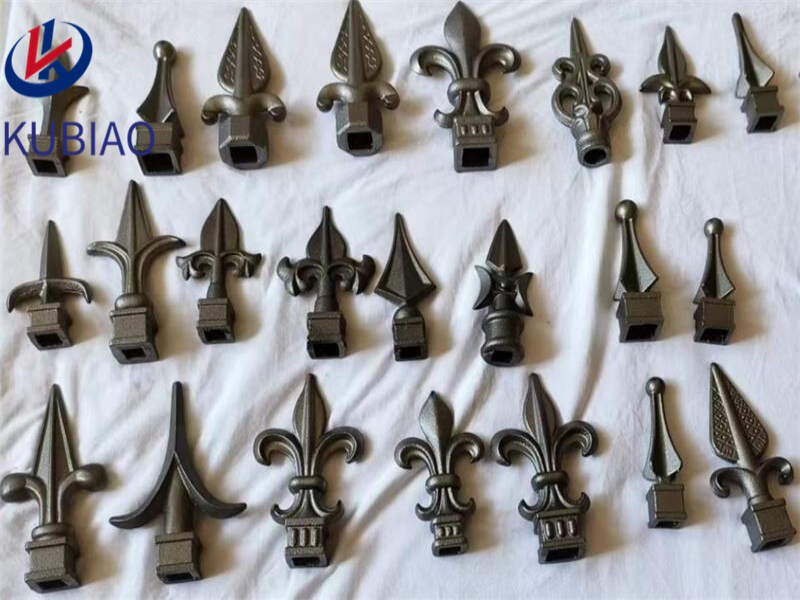
13.Why are cast iron fence ornamental commonly used in outdoor settings?
We adhere to the principle of integrity and transparency, and establish long -term relationships with partners, and we attach great importance to this detail.
1. Durability: Cast iron is a strong and durable material that can withstand harsh outdoor conditions such as rain, wind, and sunlight. It is resistant to rust and corrosion, making it a long-lasting choice for outdoor use.
2. Weather-resistant: Cast iron is able to withstand extreme temperatures without cracking or warping, making it suitable for use in both hot and cold climates.
3. Weight: Cast iron is a heavy material, which makes it less likely to be blown over by strong winds or knocked over by animals or people. This makes it a safe and stable choice for outdoor settings.
4. Decorative: Cast iron ornaments come in a variety of intricate and decorative designs, making them a popular choice for adding visual interest and charm to outdoor spaces.
5. Low maintenance: Cast iron ornaments require minimal maintenance, making them a convenient choice for outdoor settings. They can be easily cleaned with soap and water and do not need to be repainted or refinished regularly.
6. Versatility: Cast iron ornaments can be used in a variety of outdoor settings, from gardens and patios to parks and public spaces. They can also be used for a range of purposes, such as garden edging, planters, and decorative accents.
7. Historical significance: Cast iron has been used for outdoor ornaments for centuries, giving it a sense of tradition and history. This adds to its appeal and makes it a popular choice for traditional and historic outdoor spaces.
Welcome to contact us for Cast Iron Order!
Email: sales@kubiaometal.com
Cellphone/Whatsapp: 0086 13020588163
Wechat: 13028588163
Tag:flower panel ,iron ornamental design ,iron gate fitting ,ornamental cast iron spear ,metal fence toppers ,cast iron spear top
PREV: cast iron fence ornaments
NEXT: cast iron fence inserts
Product
Category